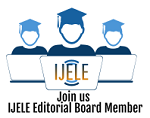(2) Cheng Jinkuan
(3) Verawati Verawati
*corresponding author
AbstractConcern about the role of school principals in improving the quality of special schools remains one of the challenges in realizing better quality education in Indonesia. However, some obstacles to the role of the principal in improving the quality of special schools still exist. Principals of special schools are still faced with obstacles to improving school quality, such as the quality of teachers. Therefore, this qualitative study aims to explore the role of the principal of the Southwest Aceh public special school in improving teacher quality. In particular, it discusses the main challenges faced by the Southwest Aceh public special school principals and the roles and strategies they use to improve teacher quality. This qualitative research is to investigate the role of the head of the Southwest Aceh public special school in Indonesia, asking the main research question, what is the role of the principal in improving teacher quality? This research was conducted using a case study design. Data was collected through in-depth interviews with school principals, observation, and secondary data, including official documents and existing literature on the role of school principals. Data analysis was used using data analysis techniques according to Miles and Huberman: data collection, data presentation, data reduction, and conclusions. The interconnected theoretical framework built through the role of the principal and the theory of quality improvement is the most suitable because it helps to understand the experience, working conditions, and challenges of exploring the role of the principal in improving school quality critically. The research findings reveal the role of the school principal in improving the quality of teachers; that is, the principal conducts guidance, coaching, and supervision, grants study permits for schools to a higher level, and conducts training to increase teacher competence. Besides that, the principal explores new ideas from teachers according to the times in the world of education and creates harmonious relationships, openness, adjustments to the curriculum, division of teaching tasks or additional assignments, and differential learning, and provides rewards and punishments to teachers who break the rules. In giving the workload of main tasks and additional assignments to teachers, the average is high, and the school program is not related to each other.
Keywordsprincipal role; special school; teacher quality
|
DOIhttps://doi.org/10.31763/ijele.v5i2.1062 |
Article metrics10.31763/ijele.v5i2.1062 Abstract views : 1148 | PDF views : 514 |
Cite |
Full Text Download Download
|
References
[1] W. de Jong, D. Lockhorst, R. de Kleijn, M. Noordegraaf, and J. van Tartwijk, “Leadership practices in collaborative innovation: A study among Dutch school principals,†Educ. Manag. Adm. Leadersh., vol. 50, no. 6, pp. 928–944, Nov. 2022, doi: 10.1177/1741143220962098.
[2] F. Elahi and M. Ilyas, “Quality management principles and school quality,†TQM J., vol. 31, no. 4, pp. 578–599, Jul. 2019, doi: 10.1108/TQM-11-2018-0173.
[3] D. Dolph, “Challenges and Opportunities for School Improvement: Recommendations for Urban School Principals,†Educ. Urban Soc., vol. 49, no. 4, pp. 363–387, May 2017, doi: 10.1177/0013124516659110.
[4] A. Somech, “Directive Versus Participative Leadership: Two Complementary Approaches to Managing School Effectiveness,†Educ. Adm. Q., vol. 41, no. 5, pp. 777–800, Dec. 2005, doi: 10.1177/0013161X05279448.
[5] A. M. Varrati, M. E. Lavine, and S. L. Turner, “A New Conceptual Model for Principal Involvement and Professional Collaboration in Teacher Education,†Teach. Coll. Rec. Voice Scholarsh. Educ., vol. 111, no. 2, pp. 480–510, Feb. 2009, doi: 10.1177/016146810911100202.
[6] P. Hallinger, L. Bickman, and K. Davis, “School Context, Principal Leadership, and Student Reading Achievement,†Elem. Sch. J., vol. 96, no. 5, pp. 527–549, May 1996, doi: 10.1086/461843.
[7] L. J. Findley, “Effective schools: The role of the principal,†Contemp. Educ., vol. 102, no. 3, p. 16, Sep. 1992, doi: 10.1016/S0012-3692(16)39081-X.
[8] S. T. Bossert, D. C. Dwyer, B. Rowan, and G. V. Lee, “The Instructional Management Role of the Principal,†Educ. Adm. Q., vol. 18, no. 3, pp. 34–64, Aug. 1982, doi: 10.1177/0013161X82018003004.
[9] J. M. Lynch, “Responsibilities of Today’s Principal: Implications for Principal Preparation Programs and Principal Certification Policies,†Rural Spec. Educ. Q., vol. 31, no. 2, pp. 40–47, Jun. 2012, doi: 10.1177/875687051203100205.
[10] M. Ruloff and D. Petko, “School principals’ educational goals and leadership styles for digital transformation: results from case studies in upper secondary schools,†Int. J. Leadersh. Educ., pp. 1–19, Dec. 2021, doi: 10.1080/13603124.2021.2014979.
[11] I. Dabaja, “Mechanisms of control and resistance in the devolved work of public school principals in New South Wales,†Labour Ind., vol. 33, no. 1, pp. 142–159, Jan. 2023, doi: 10.1080/10301763.2022.2137542.
[12] A. M. Scallon, T. J. Bristol, and J. Esboldt, “Teachers’ Perceptions of Principal Leadership Practices That Influence Teacher Turnover,†J. Res. Leadersh. Educ., vol. 18, no. 1, pp. 80–102, Mar. 2023, doi: 10.1177/19427751211034214.
[13] B. Grobler, “The school principal as Instructional Leader: A structural equation model,†Educ. as Chang., vol. 17, no. sup1, pp. S177–S199, Dec. 2013, doi: 10.1080/16823206.2014.866002.
[14] D. Kemethofer, C. Helm, and J. Warwas, “Does educational leadership enhance instructional quality and student achievement? The case of Austrian primary school leaders,†Int. J. Leadersh. Educ., pp. 1–25, Jan. 2022, doi: 10.1080/13603124.2021.2021294.
[15] K. M. Jackson, “Influence Matters: The Link between Principal and Teacher Influence over School Policy and Teacher Turnover,†J. Sch. Leadersh., vol. 22, no. 5, pp. 875–901, Sep. 2012, doi: 10.1177/105268461202200503.
[16] E.-H. Shie and S.-H. Chang, “Perceived Principal’s Authentic Leadership Impact on the Organizational Citizenship Behavior and Well-Being of Teachers,†SAGE Open, vol. 12, no. 2, pp. 1–14, Apr. 2022, doi: 10.1177/21582440221095003.
[17] Y. Yang, “Principals’ transformational leadership in school improvement,†Int. J. Educ. Manag., vol. 28, no. 3, pp. 279–288, Mar. 2014, doi: 10.1108/IJEM-04-2013-0063.
[18] I. Bafadal, A. Nurabadi, A. Y. Sobri, and I. Gunawan, “The competence of beginner principals as instructional leaders in primary schools,†Int. J. Innov. Creat. Chang., vol. 5, no. 4, pp. 625–639, 2019.
[19] J. C. Riveras-León and M. Tomà s-Folch, “The organizational culture of innovative schools: The role of the Principal,†J. Educ. Sci., vol. 42, no. 2, pp. 21–37, Dec. 2020, doi: 10.35923/JES.2020.2.02.
[20] D. Ariyani, S. Suyatno*, and M. Muhammad, “Principal’s Innovation and Entrepreneurial Leadership to Establish a Positive Learning Environment,†Eur. J. Educ. Res., vol. 10, no. 1, pp. 63–74, Jan. 2021, doi: 10.12973/eu-jer.10.1.63.
[21] M. L. Maehr and C. Midgley, “Enhancing student motivation: A schoolwide approach,†Educ. Psychol., vol. 26, no. 3–4, pp. 399–427, 1991. doi: 10.1080/00461520.1991.9653140
[22] S. Andriani, N. Kesumawati, and M. Kristiawan, “The influence of the transformational leadership and work motivation on teachers performance,†Int. J. Sci. Technol. Res., vol. 7, no. 7, pp. 19–29, 2018.
[23] J. Peters and J. Pearce, “Relationships and early career teacher resilience: a role for school principals,†Teach. Teach., vol. 18, no. 2, pp. 249–262, Apr. 2012, doi: 10.1080/13540602.2012.632266.
[24] E. A. Fisher, “Motivation and Leadership in Social Work Management: A Review of Theories and Related Studies,†Adm. Soc. Work, vol. 33, no. 4, pp. 347–367, Sep. 2009, doi: 10.1080/03643100902769160.
[25] R. A. Rossmiller, “The Secondary School Principal and Teachers’ Quality of work Life,†Educ. Manag. Adm., vol. 20, no. 3, pp. 132–146, Jul. 1992, doi: 10.1177/174114329202000302.
[26] B. Khashab, S. R. Gulliver, and R. M. Ayoubi, “A framework for customer relationship management strategy orientation support in higher education institutions,†J. Strateg. Mark., vol. 28, no. 3, pp. 246–265, Apr. 2020, doi: 10.1080/0965254X.2018.1522363.
[27] S. E. Rimm-Kaufman and B. K. Hamre, “The Role of Psychological and Developmental Science in Efforts to Improve Teacher Quality,†Teach. Coll. Rec. Voice Scholarsh. Educ., vol. 112, no. 12, pp. 2988–3023, Nov. 2010, doi: 10.1177/016146811011201204.
[28] D. Childs-Bowen, G. Moller, and J. Scrivner, “Principals: Leaders of Leaders,†NASSP Bull., vol. 84, no. 616, pp. 27–34, May 2000, doi: 10.1177/019263650008461606.
[29] M. S. Farooq, A. H. Chaudhry, M. Shafiq, and G. Berhanu, “Factors affecting students’ quality of academic performance: A case of secondary school level,†J. Qual. Technol. Manag., vol. 7, no. 2, pp. 1–14, 2011.
[30] S. Veenman, “Perceived Problems of Beginning Teachers,†Rev. Educ. Res., vol. 54, no. 2, pp. 143–178, Jun. 1984, doi: 10.3102/00346543054002143.
[31] L. Shagrir, “Professional development of novice teacher educators: professional self, interpersonal relations and teaching skills,†Prof. Dev. Educ., vol. 36, no. 1–2, pp. 45–60, Mar. 2010, doi: 10.1080/19415250903454809.
[32] M. Ainscow, “Towards a more inclusive education system: Where next for special schools?,†in Included or Excluded?, Routledge, 2006, pp. 158–169. doi: 10.4324/9780203966068-22
[33] E. W. Martin, R. Martin, and D. L. Terman, “The Legislative and Litigation History of Special Education,†Futur. Child., vol. 6, no. 1, pp. 25–39, Jan. 1996, doi: 10.2307/1602492.
[34] F. Smyth et al., “Inclusive education in progress: policy evolution in four European countries,†Eur. J. Spec. Needs Educ., vol. 29, no. 4, pp. 433–445, Oct. 2014, doi: 10.1080/08856257.2014.922797.
[35] A. Jobling * and K. B. Moni, “‘I never imagined I’d have to teach these children’: providing authentic learning experiences for secondary preâ€service teachers in teaching students with special needs,†Asia-Pacific J. Teach. Educ., vol. 32, no. 1, pp. 5–22, Mar. 2004, doi: 10.1080/1359866042000206026.
[36] B. S. Billingsley and M. James, “What are the Roles of Principals in Inclusive Schools?,†in Handbook of Effective Inclusive Schools, Routledge, 2014, pp. 77–89.
[37] K. B. M. Noor, “Case Study: A Strategic Research Methodology,†Am. J. Appl. Sci., vol. 5, no. 11, pp. 1602–1604, Nov. 2008, doi: 10.3844/ajassp.2008.1602.1604.
[38] R. Swedberg, “Exploratory Research,†in The Production of Knowledge, Cambridge University Press, 2020, pp. 17–41. doi: 10.1017/9781108762519.002
[39] N. Jain, “Survey Versus Interviews: Comparing Data Collection Tools for Exploratory Research,†Qual. Rep., vol. 26, no. 2, pp. 541–554, Feb. 2021, doi: 10.46743/2160-3715/2021.4492.
[40] M. B. Miles, A. M. Huberman, M. A. Huberman, and M. Huberman, Qualitative Data Analysis: An Expanded Sourcebook. sage, 1994.
[41] R. Murray-Harvey, P. T. Slee, M. J. Lawson, H. Silins, G. Banfield, and A. Russell, “Under Stress: The concerns and coping strategies of teacher education students,†Eur. J. Teach. Educ., vol. 23, no. 1, pp. 19–35, Mar. 2000, doi: 10.1080/713667267.
[42] G. M. Crow, C. S. Hausman, and J. P. Scribner, “Reshaping the Role of the School Principal,†Teach. Coll. Rec. Voice Scholarsh. Educ., vol. 104, no. 9, pp. 189–210, Oct. 2002, doi: 10.1177/016146810210400909.
[43] E. Szeto and A. Y.-N. Cheng, “Principal–teacher interactions and teacher leadership development: beginning teachers’ perspectives,†Int. J. Leadersh. Educ., vol. 21, no. 3, pp. 363–379, May 2018, doi: 10.1080/13603124.2016.1274785.
[44] R. Stiggins and D. Duke, “Effective Instructional Leadership Requires Assessment Leadership,†Phi Delta Kappan, vol. 90, no. 4, pp. 285–291, Dec. 2008, doi: 10.1177/003172170809000410.
[45] M. Rizvi, “The Role of School Principals in Enhancing Teacher Professionalism,†Educ. Manag. Adm. Leadersh., vol. 36, no. 1, pp. 85–100, Jan. 2008, doi: 10.1177/1741143207084062.
[46] M. Özcan, “Teachers’ Evaluation on School Principals' Supervision,†Educ. Policy Anal. Strateg. Res., vol. 15, no. 2, pp. 303–321, Jun. 2020, doi: 10.29329/epasr.2020.251.17.
[47] C. Forlin, “Teacher education reform for enhancing teachers’ preparedness for inclusion,†Int. J. Incl. Educ., vol. 14, no. 7, pp. 649–653, Nov. 2010, doi: 10.1080/13603111003778353.
[48] T. R. Guskey, “Professional Development and Teacher Change,†Teach. Teach., vol. 8, no. 3, pp. 381–391, Aug. 2002, doi: 10.1080/135406002100000512.
[49] K. Leithwood and D. Jantzi, “Transformational Leadership: How Principals Can Help Reform School Cultures,†Sch. Eff. Sch. Improv., vol. 1, no. 4, pp. 249–280, Dec. 1990, doi: 10.1080/0924345900010402.
[50] G. Southworth, “Instructional Leadership in Schools: Reflections and empirical evidence,†Sch. Leadersh. Manag., vol. 22, no. 1, pp. 73–91, Feb. 2002, doi: 10.1080/13632430220143042.
[51] M.-D. Lin, “Cultivating an Environment That Contributes to Teaching and Learning in Schools: High School Principals’ Actions,†Peabody J. Educ., vol. 87, no. 2, pp. 200–215, Apr. 2012, doi: 10.1080/0161956X.2012.664467.
[52] E. M. Skaalvik and S. Skaalvik, “Teacher job satisfaction and motivation to leave the teaching profession: Relations with school context, feeling of belonging, and emotional exhaustion,†Teach. Teach. Educ., vol. 27, no. 6, pp. 1029–1038, Aug. 2011, doi: 10.1016/j.tate.2011.04.001.
Refbacks
- There are currently no refbacks.
Copyright (c) 2023 Muhammad Sahuddin, Cheng Jinkuan, Verawati Verawati

This work is licensed under a Creative Commons Attribution-ShareAlike 4.0 International License.

International Journal of Education and Learning
ISSNÂ 2684-9240
Published by Association for Scientific Computing Electronics and Engineering (ASCEE)
W : http://pubs2.ascee.org/index.php/ijele
E : zalik@ascee.org

This work is licensed under a Creative Commons Attribution-ShareAlike 4.0 International License.





















